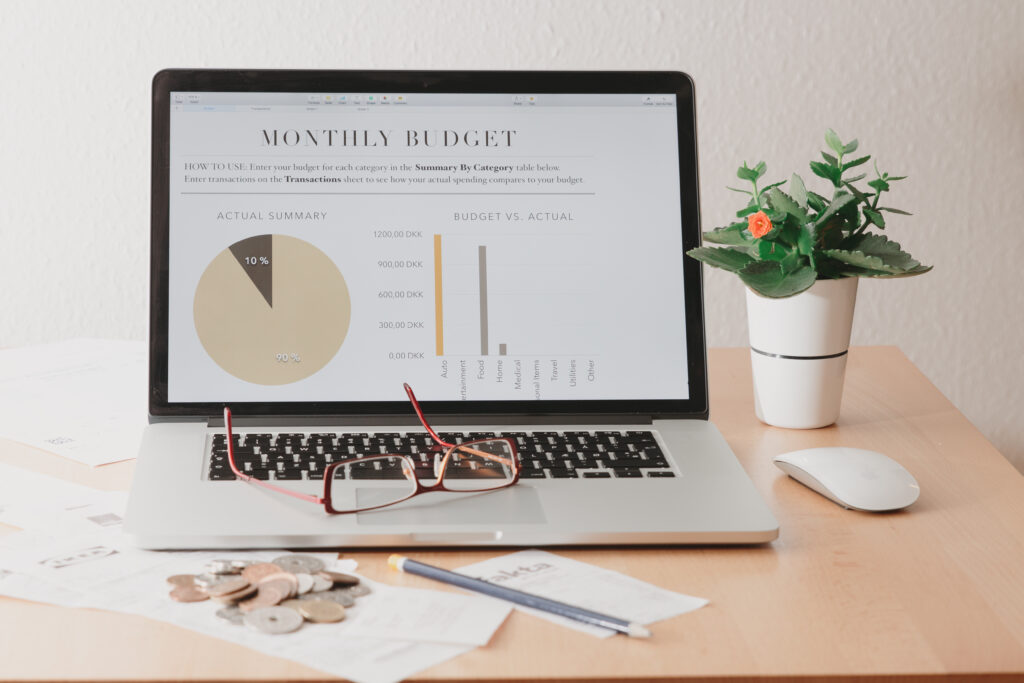This post may contain affiliate links. Click here to read my full disclosure.
Sticking to a budget can be challenging, but there are several strategies you can use to make it easier. Believe me: budgeting your money is more important than ever this year! Not to go all doom and gloom on you, but have you seen the price of eggs?!
Here’s how to get started budgeting your money:
Create a Realistic Budget (Keep it Real)
Start by listing all of your income and expenses. Start with the essentials but add in all discretionary spending (and I do mean all of your discretionary spending, including twice yearly Botox, coffee subscriptions, and happy hour libations).
Determine your savings goals and set aside money for savings every paycheck. Be sure to include all regular expenses, such as rent/mortgage, utilities, transportation, and groceries, as well as any irregular expenses like annual insurance payments or holiday gift giving.
Track your Spending When Budgeting your Money
Keep track of your spending throughout the month to ensure you’re staying within your budget. You can use a budgeting app or spreadsheet to track your expenses. I recently purchased the Passionate Penny Pincher Home Planner, and I am in love. I’m incredibly picky about my budgeting planners, and while no planner has ever featured exactly what I’m looking for, this one is pretty darn close!
I actually modified the first page of every monthly section (currently a notebook page) by drawing a straight line dividing the page in half with two columns. On one side, I budget the first paychecks of the month, and the other side is used to budget the second paychecks of the month. My husband and I are paid semi-monthly, so it works best for us this way.
I’ve never been able to look at an entire monthly spread and digest it fully.
Prioritize your Spending
Identify your most important expenses, such as rent or mortgage, and make sure to allocate enough money for those first. Then, prioritize your other expenses based on their importance to you. Tithes, savings, child support, school tuition, would usually be listed first with car payments, household expenses, groceries, and fuel following.
Avoid Impulse Purchases
Impulse buying can quickly blow your budget. To avoid impulse buying, make a list of the things you need and stick to it when you go shopping. If you know that you have a bad habit of over-spending at the grocery store, take cash instead of your cards. Leave the cards at home, and you’ll be forced to stick to a budget.
Cut Costs Where you Can
Review your expenses and look for areas where you can cut costs, such as reducing your cell phone bill or eating out less. Evaluate your subscriptions. Hulu, YouTube TV, HBO Max, Amazon Prime, coffee subscriptions, subscription boxes, etc will quickly sabotage your financial goals if you aren’t careful.
Set Financial Goals
Set financial goals for yourself such as saving for a down payment on a home or paying off credit card debt. Having a specific goal in mind can help you stay motivated to stick to your budget.
With credit card interest rates up to 30% APR, it’s time to say goodbye to giving your money to the bank. The debt snowball method is a tried and true method. Love him or hate him, Dave Ramsey was onto something with his Financial Peace University. I’ve never taken the class, but I’ve watched plenty of his videos for free on YouTube.
With tax season upon us, you may have a goal to save $10,000 for taxes by April. Whatever your goal is, write it down and look at it often. Remind yourself of your “why”.
Be Flexible
Life happens, and you may need to adjust when budgeting your money from time to time. Be willing to adjust your budget when unexpected expenses arise and don’t beat yourself up if you slip up. I’ll say it again for the readers in the back. The key is to learn from your mistakes and keep moving forward.
Make Saving Automatic
Set up automatic transfers from your checking account to your savings account every single payday. This way, you’ll save a portion of your income before you have a chance to spend it. When it’s automatic, you don’t have to second-guess your decision to save (something you definitely shouldn’t do).
Cash is King
Using cash instead of credit or debit cards can help you when budgeting your money. When you see the cash leaving your wallet, it can be a more tangible reminder of how much you’re spending.
I don’t know about you, but it’s a whole lot harder to hand the cashier a $100 bill than it is to swipe my debit card for a $200 purchase.
Reward Yourself
Set up a reward system for yourself when you stick to your budget. Treat yourself to something special, like a night out or a new book when you reach your budgeting goals.

Get an Accountability Partner
Find someone, a friend or family member, who will hold you accountable for sticking to your budget. Share your budget with them and check in with them regularly to report your progress. If your partner isn’t onboard with the plan, it’s going to be tough, and you’ll either experience money fights or resentment.
Important note: Don’t share with people who don’t encourage you to reach your financial goals! There will be naysayers, negative Nancy’s, who will try to tell you it’s impossible to stick to a budget and that you’re wasting your time. Don’t talk to those people about your goals.
Remember, budgeting your money takes time, effort, and discipline. It’s not always easy, but it’s worth it to gain control of your finances and reach your financial goals. What tools are you using to stick to a budget this year?

Life is a collection of memories and experiences. There are ups and downs. I am so grateful for God’s grace and am on the journey to a renewed spirit, free of perfectionism. Perfection Hangover offers the sober truth – no filter.











